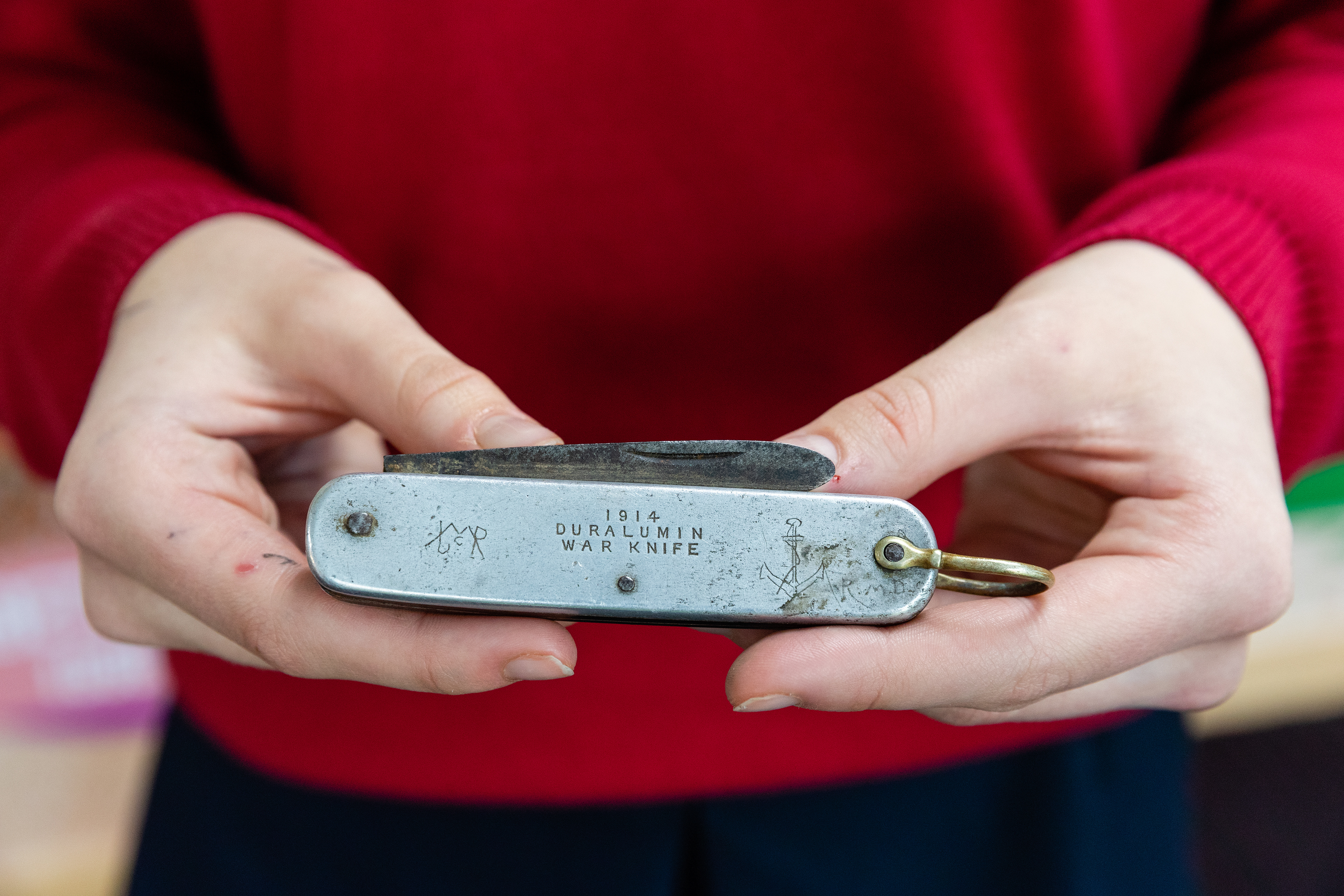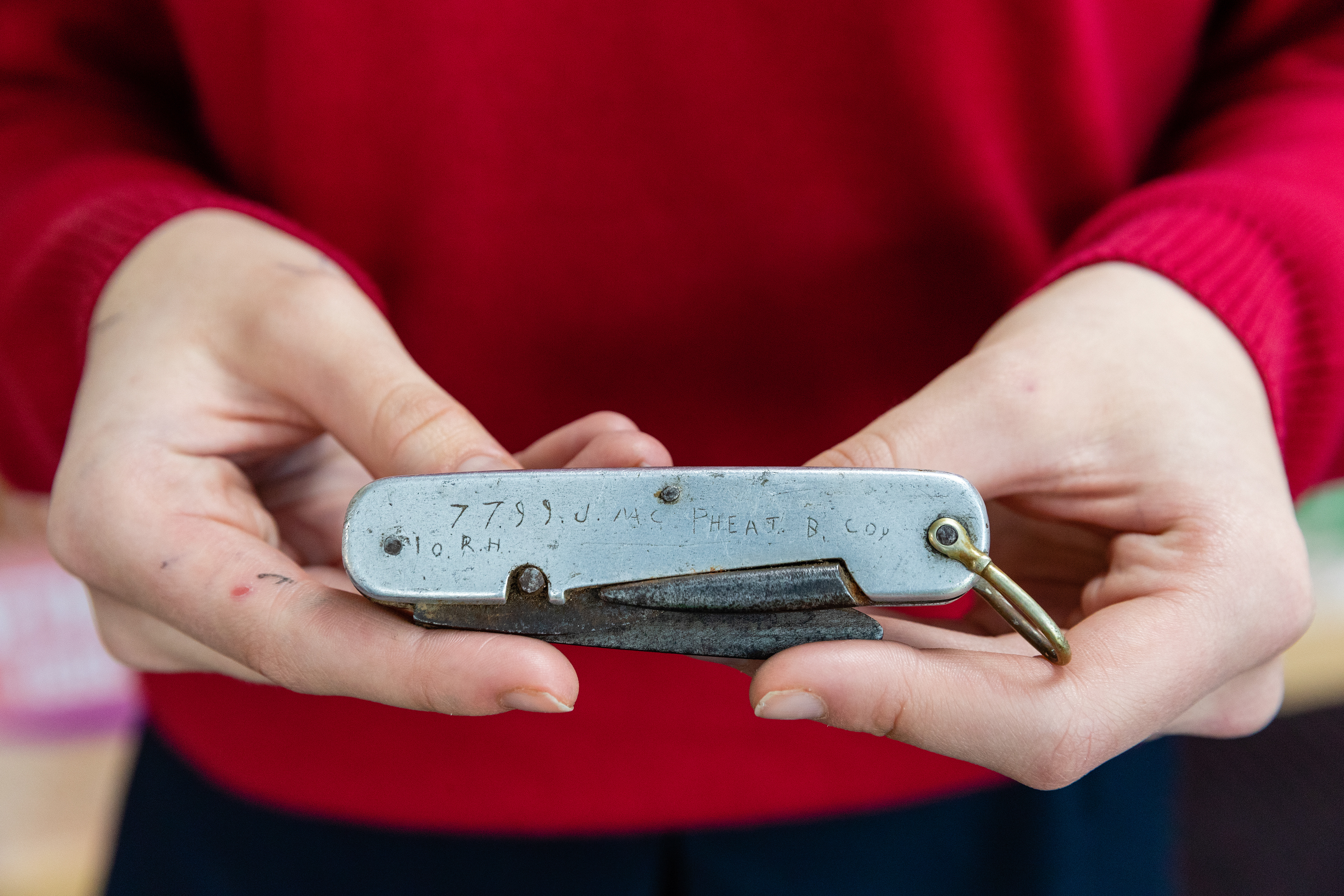Mr Herbert points out that the story 'would never have happened in any other era of the school’s history.’ Muriel sees that people are more interested, more engaged with social history as a result of the internet. She is animated when she explains: ‘Without the internet this story would never have come to light... Without the ability to make the links we would never have known about Caitlin, and consequently Duncan and his search and so on. So, it would have all been untapped territory and it’s absolutely through the internet.’
They say timing is everything. For Mr Herbert, fate has, perhaps, played a hand: ‘The fact that at the very same time that Caitlin had written her article this knife was brought into the Heritage Centre... because if that hadn’t aligned then she wouldn’t have received the knife and there must be a certain degree of fate about it because, of course, if the knife had been discovered - or been handed in - a week or two before, Caitlin wouldn’t have written her article and that wouldn’t have existed on the internet. So, I do think it’s almost like a miracle, isn’t it, that it’s ended up back with the family because realistically the knife probably wouldn’t have been put on display in this Heritage Centre. It would have been catalogued and put in a drawer and it was only because of the curiosity of Muriel that it actually... she was just curious to find out who this person was!
I just think it’s quite inspiring what Caitlin’s done, and I think it’s going to really, kind of, provoke me in the future to think, well, if a student does have a story, a personal story to tell, just to put it on the newsletter. To encourage them to write it because you just don’t know what might come of it. It might be nothing, it might end there. It might be a good story. It might end up with something like Caitlin’s story with something really personal that the family can really cherish. So, I think - going forwards - I think, I’m definitely going to make sure that these kinds of stories are available to be Googled on the internet using our newsletter, and you never know what might turn up.
I think things like this really do, kind of, motivate you as a teacher! To make you think, actually, what you’re doing is worthwhile.’
Caitlin has definitely been inspired and I wonder, as a young person exploring the internet, what she thinks: ‘Being surrounded by young people all the time you see a lot of negatives. You see things happen. You hear these awful stories but it’s amazing how sometimes there are still, like, great things like this that can come out of such, like, not a bad place but what’s perceived as quite a bad place now, isn’t it? You don’t often here things like this so, yeah... to be honest I agree with Sir, like, I’d love to hear of other students going through a similar situation as this. It is, it’s really close to home, and I know that many families would love something like this.’
For Muriel, an outward look might be an answer to a less uncomfortable and more positive internet experience for young people today: ‘The facility that the young have now of using the internet, and social media, and all these things that are possibly very useful things – can be harmful – but they’re extremely useful,’ she explains, ‘and I think it’s because it’s opening up the world, as I said. It’s maybe... maybe we should concentrate on focusing the young people away from themselves and towards other people because social media can make them turn inward and reflect totally on themselves. And the internet can allow them to do the exact opposite by opening up stories and experiences of other people and they can learn from that.’
I think of the day the knife came into school. I happened to walk past Mr Herbert, very excitedly, showing the knife to Mrs Pomoroy, the Headteacher, on a corridor. Timing is everything. What really struck me at the time was how that knife had been carefully packaged... in an iPhone box! Mr Herbert said: ‘Oh. Look. How wonderful it fits’ and I said ‘Look! It’s in an iPhone box. How great is that!’ I had to ask Muriel: ‘When you sent the knife down to Penwortham Girl’s High School it was in an iPhone box. Could you just tell me about that... probably just a box or was there...?
Bursting into laughter, Muriel bestows: ‘Yeah, well, I thought it was very apt that the modern and the ancient – or the not-so-ancient – were coming together. It also happened to fit very neatly into the box. But yes. I did think it was quite appropriate.’
Back in Duncan’s living room, towards the end of our conversation, I ask Duncan what it was actually like to physically hold the knife. Caitlin offered: ‘The emotions?’
‘You can’t, you can’t put,’ a long pause, ‘words to that,’ says Duncan. He coughs, and after a further long pause... ‘Cut’. I cut the recording.
When we return, with a deeper tone, I ask Duncan what can Caitlin’s generation do to make the world a better place, to solve the mess that seem to be reoccurring: ‘Caitlin and her kind have got a lot of hard work ahead of them. That’s the only thing I can say. Its go, go, go. In time to come, I’ve no doubt that people in high-ranking places will do the same stupid things that my people did, you know?’ Says Duncan. ‘Well, we do try. I don’t know, could we try a bit harder maybe? How can you, for instance... how can you put a forget-me-knot blanket on Ukraine? You can’t. It’s too big. It’s stupidly too big. It really is. Erm... and I don’t know... well, we’re afraid of him putting his finger on the nuclear button, aren’t we?
To Caitlin, I ask how her generation is going to fix the things that our generations have made a mess of. Pausing for thought: ‘I have no idea to be honest. It’s a big mess,’ she says. ‘I do often think, you know, why hasn’t the world learnt from previous situations? Why do we have to keep repeating the same cycle with war? To be honest, I’m just hoping there’s some way out there that will… not sort it out for sure but, like, do you know what I mean, like, stop it in a way?
Sitting with her Great-Grandfather, Caitlin turns to Duncan and says: I’d just like to say that, you know, I’m glad that I’ve done this for you. I feel, like, I’ve… I don’t know how to describe it, but I feel like I’ve done something special for you and made you feel happy if that makes sense.’
Quickly, Duncan replies: ‘Finalise it by going to Aberfeldy, ok?’ Caitlin says: ‘Yeah, I’ll get my mum to take me.’
‘Yep, she will! She will, she will, she will. Yep. That’s where I’m going to finish up,' says Duncan. ‘My father is buried in Aberfeldy... And that’s where I’m going. I’m going back to my father and so is my son.’

